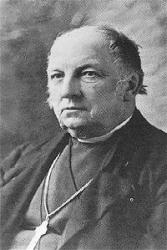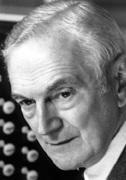Planning worship?
Check out our sister site, ZeteoSearch.org,
for 20+ additional resources related to your search.
- |
User Links
Person Results
John Bacchus Dykes

1823 - 1876 Person Name: Rev. J. B. Dykes Composer of "STRENGTH AND STAY" in Church Hymns and Tunes As a young child John Bacchus Dykes (b. Kingston-upon-Hull' England, 1823; d. Ticehurst, Sussex, England, 1876) took violin and piano lessons. At the age of ten he became the organist of St. John's in Hull, where his grandfather was vicar. After receiving a classics degree from St. Catherine College, Cambridge, England, he was ordained in the Church of England in 1847. In 1849 he became the precentor and choir director at Durham Cathedral, where he introduced reforms in the choir by insisting on consistent attendance, increasing rehearsals, and initiating music festivals. He served the parish of St. Oswald in Durham from 1862 until the year of his death. To the chagrin of his bishop, Dykes favored the high church practices associated with the Oxford Movement (choir robes, incense, and the like). A number of his three hundred hymn tunes are still respected as durable examples of Victorian hymnody. Most of his tunes were first published in Chope's Congregational Hymn and Tune Book (1857) and in early editions of the famous British hymnal, Hymns Ancient and Modern.
Bert Polman
John Bacchus Dykes
Louis Bourgeois
1510 - 1561 Composer or Adapter of "L'OMNIPOTENT" in The Worshipbook Louis Bourgeois (b. Paris, France, c. 1510; d. Paris, 1561). In both his early and later years Bourgeois wrote French songs to entertain the rich, but in the history of church music he is known especially for his contribution to the Genevan Psalter. Apparently moving to Geneva in 1541, the same year John Calvin returned to Geneva from Strasbourg, Bourgeois served as cantor and master of the choristers at both St. Pierre and St. Gervais, which is to say he was music director there under the pastoral leadership of Calvin. Bourgeois used the choristers to teach the new psalm tunes to the congregation.
The extent of Bourgeois's involvement in the Genevan Psalter is a matter of scholarly debate. Calvin had published several partial psalters, including one in Strasbourg in 1539 and another in Geneva in 1542, with melodies by unknown composers. In 1551 another French psalter appeared in Geneva, Eighty-three Psalms of David, with texts by Marot and de Beze, and with most of the melodies by Bourgeois, who supplied thirty four original tunes and thirty-six revisions of older tunes. This edition was republished repeatedly, and later Bourgeois's tunes were incorporated into the complete Genevan Psalter (1562). However, his revision of some older tunes was not uniformly appreciated by those who were familiar with the original versions; he was actually imprisoned overnight for some of his musical arrangements but freed after Calvin's intervention. In addition to his contribution to the 1551 Psalter, Bourgeois produced a four-part harmonization of fifty psalms, published in Lyons (1547, enlarged 1554), and wrote a textbook on singing and sight-reading, La Droit Chemin de Musique (1550). He left Geneva in 1552 and lived in Lyons and Paris for the remainder of his life.
Bert Polman
Louis Bourgeois
E. J. Hopkins

1818 - 1901 Person Name: E. J. Hopkins, 1818—1901 Composer of "[Ancient of Days, who sittest throned in glory]" in The Lutheran Hymnary Dr Edward John Hopkins MusDoc United Kingdom 1818-1901. Born at Westminster, England, the son of a clarinetist with the Royal Opera House orchestra, he became an organist (as did two of his brothers) and a composer. In 1826 he became a chorister of the Chapel Royal and sang at the coronation of King William IV in Westminster Abbey. He also sang in the choir of St. Paul’s Cathedral, a double schedule requiring skill and dexterity. On Sunday evenings he would play the outgoing voluntary at St. Martin’s in-the-field. He left Chapel Royal in 1834 and started studying organ construction at two organ factories. He took an appointment at Mitcham Church as organist at age 16, winning an audition against other organists. Four years later he became organist at the Church of St. Peter, Islington. In 1841 he became organist at St. Luke’s, Berwick St., Soho. Two Years later he was organist at Temple Church, which had a historic organ (built in 1683). He held this position for 55 years. In 1845 he married Sarah Lovett, and they had four sons and five daughters. He was closely associated with the Bach Society and was organist for the first English performances of Bach’s St. Matthew Passion. In 1855 he collaborated with Edward Rimbault publishing “The organ, its history and construction” (3 editions 1855-70-77). In 1864 he was one of the founders of the “College of organists”. In 1882 he received an honorary Doctorate of Music from the Archbishop of Canterbury. He composed 30+ hymn tunes and some psalm chants, used by the Church of England. He died in London, England.
John Perry
E. J. Hopkins
William Croswell Doane

1832 - 1913 Person Name: William C. Doane Author of "Ancient of days, who sittest throned in glory" in The Hymnal Doane, William Croswell, D.D., son of Bp. G. W. Doane (p. 303, ii.), was born at Boston, Mass., March 2, 1832, and ordained D. 1853, and P. 1856, in the Prot. Episcopal Church of America. He was Rector of Burlington, N.J., Hartford, Conn, and Albany; and since 1869 Prot. Episco. Bishop of Albany. He is the author of a Biography of his father, and other works. His fugitive verse was collected and published [in 1902], as Rhymes from Time to Time. His hymn, "Ancient of Days, Who [that] sittest throned in glory" (Holy Trinity), was written for the Bicentenary of the City of Albany, 1886. In some collections it begins with stanza ii., "O Holy Father, Who hast led Thy children." For full text see The Hymnal, edition 1892, of the Prot. Episco. Church of America, No. 311. Bp. Doane is D.D. of Oxford, and LL.D. of Cambridge. [Rev. L. F. Benson, D.D.]
--John Julian, Dictionary of Hymnology, New Supplement (1907)
William Croswell Doane
J. Albert Jeffery
1855 - 1929 Composer of "ANCIENT OF DAYS" in The Hymnal Born: October 26, 1855, Plymouth, England.
Died: June 4, 1929, Brookline, Massachusetts.
Jeffery (sometimes misspelled as Jeffrey) began playing the organ at St. Anne’s Cathedral in Plymouth at age 14, taking over his father’s position. He emigrated to America in 1876 and settled in Albany, New York. He developed a chorus and directed the music at St. Agnes School, and played the organ at the Protestant Episcopal Cathedral. He left for Yonkers, New York, in 1893, and served at the First Presbyterian Church. Later, he taught music at the New England Conservatory.
--www.hymntime.com/tch
J. Albert Jeffery
Alec Wyton

1921 - 2007 Person Name: Alec Wyton, b. 1921 Composer of "COBURN" in The Hymnal 1982
Alec Wyton is described in Grove's Dictionary of Music and Musicians, by saying, "Wyton has brought together and caused to flourish three separate traditions: English church music, American church music and music from outside the churches." Also bringing together clergy and musicians of the Episcopal Church, he was the Coordinator of the Standing Commission on Church Music from 1974 to 1985; he was Minister of Music at St. Stephen's Church, in Ridgefield, Conn., from 1987 until his appointment as Minister of Music Emeritus in 2004; and he was Founder and Chairman of the Church Music Department of the Manhattan School of Music. Wyton is the award-winning ASCAP composer of over 100 published works; editor of the Anglican Chant Psalter; contributor of articles to professional journals; performer, teacher and lecturer: he is the complete musician. From 1954 to 1974 he was Organist and Master of the Choristers at the Cathedral of St. John the Divine and Headmaster of the Cathedral Choir School. He taught at Union Theological Seminary in NYC and was Chairman of the Organ Department at Westminster Choir College, Princeton.
Wyton was born in London in 1921. He earned degrees from the Royal Academy of Music and Oxford University. He came to the United States in 1950, working briefly in Dallas and St. Louis. Wyton died on March 18, 2007, after a prolonged illness.
He has traveled throughout the US and Canada playing recitals, conducting workshops, master classes and hymn festivals stressing the coexistence in liturgy of great music and literature of the past with new and exciting works by artists of our time.
--www.selahpub.com
Alec Wyton
Horatio W. Parker
1863 - 1919 Person Name: Horatio Parker Composer of "ANCIENT OF DAYS" in The Hymnal
Horatio W. Parker
Eric Shave
1901 - 1996 Composer of "EASTWOOD" in Rejoice in the Lord Eric Shave was a minister of the Congregational Church in England and Wales. EASTWOOD was written for an event at his first pastorate, Eastwood Congregational church in Nottingham.
Companion to 'Rejoice and Sing,; The United Reformed Church (UK) songbook
Eric Shave


 My Starred Hymns
My Starred Hymns


